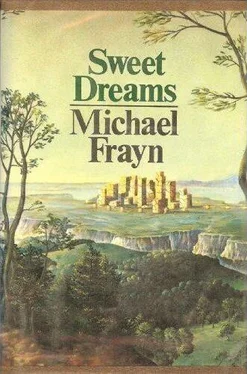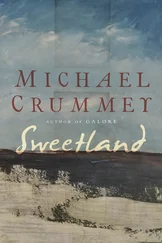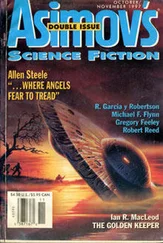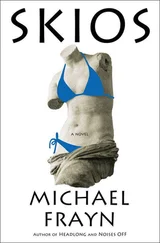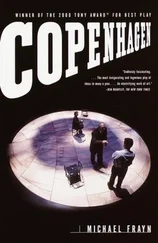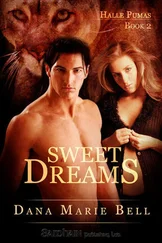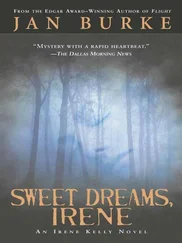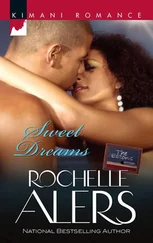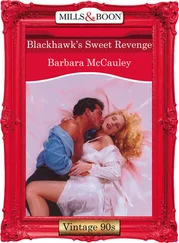Michael Frayn
Sweet Dreams
A man sits in his car at the traffic-lights, waiting for them to go green.
He is thirty-seven years old, with a high forehead, and thin hair that stands on end in the slightest breeze. His eyes are a little protuberant, and his lips are set in a faint smile, so that as he leans forward against the wheel, gazing straight ahead through the windshield, he seems to be waiting for the green light with eagerness.
In fact the light has been green for some time already.
Howard Baker (this is his name) is sitting in front of a green light waiting for a green light because he is thinking. He is wondering:
— whether he is adequately insured;
— whether it’s Hornsey Lane he is about to enter on the other side of Highgate Hill, or whether he has confused Highgate Hill with Highgate West Hill once again;
— whether life might really be coming to an end, as ecologists say;
— whether he should kiss Rose, the wife of the man he is on his way to see, when she opens the front door to him;
— whether, conceptually, it would be helpful to try regarding the house as an extension of the car, rather than the other way about, and experimenting with an internal trim based upon black simulated leather, with built-in ashtrays;
— whether he will be invited to lunch with Rose and Phil, and if not, whether to get a sandwich in a pub, or go straight back to the office, send out for sandwiches, and catch up on the plans for the Manchester Marina scheme; and if so, whether to order egg and tomato sandwiches, or cheese and chutney, or some of each;
— whether the girl standing on the opposite side of Highgate Hill (or Highgate West Hill) with the long dark hair blowing forward over her shoulder will turn so that he can see her face; and if so, whether the face will be the revelation that the long dark hair promises; and what a face would have to be like to be the revelation that one always expects …
Another car pulls up behind him, and hoots discreetly — pup-pup. He does not hear it.
The lights go yellow.
The girl is just about to turn. She is gazing up Highgate Hill (or Highgate West Hill), waiting for someone. At any moment she will turn round and check that her friend is not coming from the opposite direction.
The lights go red.
Howard Baker now recalls an unanalysed sound waiting in his memory for attention — a pup-pup, a sound of hooting. He looks quickly in his mirror, and sees the head of the man in the car behind move from side to side with sardonic patience. Smiling foolishly, he puts the car into gear, and violently accelerates away, taking one last look at the girl, just in case she turns.
And she does. She turns to look at him . Her face is astonished — blank with astonishment. An attractive face, with dark eyes and dark eyebrows, but no revelation. Just amazed, with the mouth a little open, as if preparing to formulate some cry.
So that’s one thing settled. The problem of lunch he doesn’t resolve, or whether to kiss Rose, or the question of internal trim in public housing. But he does find out whether it’s Hornsey Lane on the other side of Highgate Hill (or Highgate West Hill).
It’s not. It’s a ten-lane expressway, on a warm midsummer evening, with the sky clearing after a day of rain.
The expressway! Of course! How obvious everything is when once it’s happened.
He drives with the windows down, warm air streaming around him, swept along in a jewelled red river of tail lights five lanes wide.
They are approaching some great metropolis. The expressway flies over quiet suburban streets with old-fashioned lamps coming on among the elms. A pagoda is silhouetted against the golden west, then a windmill with sails turning, picked out with coloured lights, then a floodlit château with pink pigs standing outside it on their hind legs, sharpening knives and holding up menus. Neon signs flash and shift, ghostly pale against the sunset, brilliant against the piled black clouds in the north. He recognizes some of them — the Pan-Am symbol, Dagens Nyheter , the Seven Names of God. Electric characters announce the temperature and humidity, closing prices on the stock market, and the latest digits reached in the computation of the value of pi . There is a smell of coffee in the air. In the forecourt of a pancake house the gigantic figure of a woman revolves on top of a pylon, picked out by spotlights, standing on tiptoe, high-kicking. He cranes to catch sight of her face, and as she turns towards him he sees that it is Saint Julian of Norwich. “And all shall be well,” she tells him softly, over the car radio, “and all manner of things shall be well.”
He knows that she is right; all manner of things will be well in this city he is entering. He is not at all tired, even though he has driven so far. A restless excitement stirs in him, a sense of being on the verge of deep and different things.
The expressway turns to cross water full of the redness of the sky, and there, floating on the horizon above the shining red water, are the clustered towers of the inner city, purple with distance, lights shining in a million windows — exactly as he has always known they would be. Now other freeways are converging upon his, passing above and beneath, wheeling and turning all round him. He follows the Downtown postings, up, round, through, and over; one of a thousand particles circling the orbits of a complex molecule.
When he emerges from this the towers are much closer. They rise straight up into the sky above him. He can see into some of the windows. In one room two people are dancing to music which only they can hear. In another a family is just sitting down to its evening meal. Faintly he can smell soup and taste radishes and wine.
Now he is driving slowly along a straight street cut like a slot between the towers. It’s hot. People stroll in their shirt sleeves, and sit at sidewalk cafes. One man is just taking another by the arm as he passes, and laughing in surprise. Yellow taxicabs race past, swerving in front of him, braking violently at stop lights.
He drives on until he comes to an open square with people eating at tables under the trees. High up on the other side of the square is a sign on which words pass rapidly from right to left across a bank of lights.
“Howard Baker?” say the words on the sign as Howard gets out of the car. He looks up, surprised, then glances round to see if anyone else has noticed.
“So here you are!” forms the sign smoothly. “But don’t feel any sense of anticlimax, because everyone here wants to meet you, and all sorts of parties are being arranged, and several people are going to be calling you in the morning.”
He grins, embarrassed and pleased.
“The silly buggers!” he says.
In your first few hours in a new place, while you’re still dazed, before you can even really believe you’ve arrived, you see it more vividly and more clearly than you ever will again. Even after a few minutes — even while the porter is still showing him to his room — Howard feels that he has understood a great deal about this city. He could write a book about it.
“There’s something in the air in this place!” he tells the porter. “I really feel alive here!”
“Sure,” says the porter. “You’re really going to have yourself a good time.”
He’s got brown eyes and a smiling face — the sort of man who knows his way around, and who’ll fix anything for you. Howard takes to him. He feels he can talk seriously with him.
“What’s happening here?” he asks him seriously. “What’s the political situation at the moment? When are the elections coming up? Are you free? What do you have to pay for a pair of men’s shoes, for example? Have you been hit by inflation?”
Читать дальше
